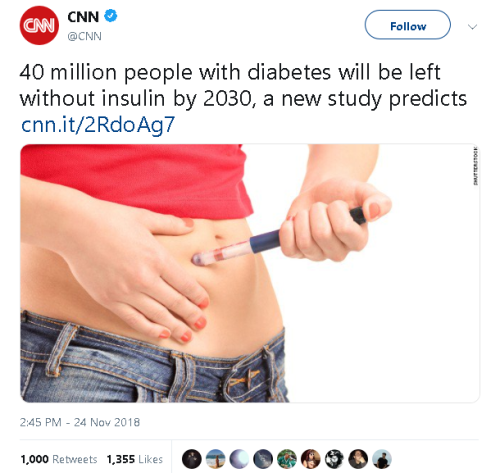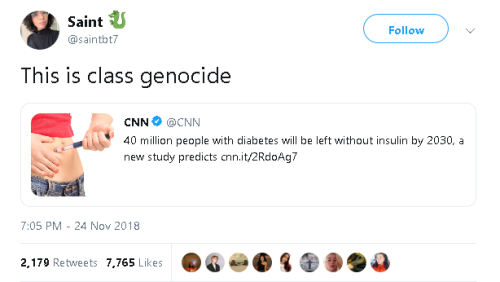plantyhamchuk:trekmemes:ohnoagremlin: gahdamnpunk: AND a race one since the most affected regions wi
plantyhamchuk:trekmemes:ohnoagremlin: gahdamnpunk: AND a race one since the most affected regions will be Africa, Asia and Oceania as a friend pointed out, this headline makes it sound like supply will be dwindling. supply is fine. people will be *priced out*. this is fucking MURDER.insulin has been mass produced (from animal extracts) since -1923-. slow acting insulin has existed since the ‘50s, and ‘human’ genetically engineered insulin (derived from E. coli bacteria) has existed since 1982.insulin treatment for diabetes is not some new or ‘unproven’ treatment. according to beyondtype1, “Humalog rapid-acting insulin came on to the market with a list price of $21 a vial in 1997.” adjusting for inflation, a vial these days should cost about $34 at most. instead, it costs over $300. there is NO reason for it to be steadily gaining in price to the point that diabetics are unable to afford their lifesaving medication, other than the sheer inhuman greed of pharmaceutical manufacturers. let me reiterate: life without insulin (for Type 1 diabetics in particular) is a slow and painful death sentence. the ability to treat diabetes is a relatively modern phenomenon that has allowed countless people to live full, healthy lives. we should be expanding full covereage and access to insulin to diabetics the world over, and it should be FREE. Have y’all heard about Open Insulin Foundation?“ We’re a team of biohackers with a variety of backgrounds, and skills, and relationships to insulin and diabetes from many cities and countries around the world, including Oakland, California; Baltimore, Maryland; Paraiba, Brazil; Dakar, Senegal; Yaounde, Cameroon; and Puerto Rico. We’re working to develop the first practical, small-scale, community-centered model for insulin production to make insulin accessible to all. We envision a world in which communities in need have local sources of safe, affordable, high-quality insulin, and where people living with diabetes and their communities can own and govern the organizations that produce the medicine they depend on to survive. What We DoWe are creating an open-source (freely available) model for insulin production that centers on sustainable, small-scale manufacturing and open-source alternatives to production. We are developing protocols to produce short-acting (lispro) and long-acting (glargine) insulin, working on developing open-hardware equivalents to traditional production equipment, are researching sustainable regulation pathways to bring our insulin to the public, and are building capacities for local, small-scale manufacturing.How Do I Participate?Our work would not be possible without the support of volunteers, interns, and community advisors. We welcome people of all backgrounds from all over the world to bring their enthusiasm, time, connections, and experiences, both in life and in work. Our volunteers promote us on social media, build equipment, run experiments, write reports and blog posts, facilitate meetings, connect with other organizations and groups, meet with experts in the field, run virtual events, and contribute in designing tools, resources, and methods of all sorts. Potential PartnersWe welcome collaboration with other groups that share our mission―community labs, academic institutions, patient advocacy groups, and NGOs.DonateYour donation will help us get closer to our goal. With a healthy financial situation, we can pay for lab supplies, acquire lab equipment, recruit scientists, and pay for consultation fees for regulation and manufacturing experts.”Open Insulin Foundation -- source link

